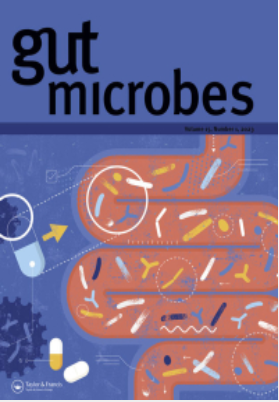婴儿肠道菌群失调与妊娠期糖尿病母亲母乳脂肪酸组成改变有关:一项前瞻性队列研究。
IF 12.2
1区 医学
Q1 GASTROENTEROLOGY & HEPATOLOGY
引用次数: 0
摘要
妊娠期糖尿病(GDM)与子代肠道菌群失调有关,但其机制尚不清楚。本前瞻性研究探讨了人乳脂肪酸组成在这种关联中的作用。在妊娠24-28周招募GDM母亲和正常对照者。于产后1-3天和产后1个月进行随访,收集人乳和婴儿粪便。本研究共纳入80对母婴,其中GDM组40对,正常组40对。这些母亲接受了饮食和运动方面的指导,但没有接受药物治疗。所有婴儿都是纯母乳喂养。我们在产后1-3天或产后1个月观察到GDM组与正常组婴儿8门13属有显著差异。在这些细菌中,经混杂因素调整后,7个门(如Acidobacteriota、Gemmatimonadota和Myxococcota)和9个属(如Sphingomonas、alloorhizobium Neorhizobium Pararhizobium Rhizobium和TM7a)存在显著的时间×群相互作用。这些差异婴儿细菌的变化与母乳中C18:3n-3和总n-3 PUFA水平的变化呈负相关。与GDM组相比,正常组母乳中C18:3n-3和总n-3 PUFA水平随时间的增加要大得多。我们的研究结果表明,人乳脂肪酸组成的改变是导致后代gdm相关肠道菌群失调的一个重要原因。本文章由计算机程序翻译,如有差异,请以英文原文为准。
Dysbiosis of infant gut microbiota is related to the altered fatty acid composition of human milk from mothers with gestational diabetes mellitus: a prospective cohort study.
Gestational diabetes mellitus (GDM) is known to be associated with dysbiosis of offspring gut microbiota, but the mechanism remains unclear. The present prospective study explored the role of human milk fatty acid composition in this association. Mothers with GDM and normal controls were recruited at 24-28 gestational weeks. Follow-up was conducted at 1-3 days postpartum and 1 month postpartum to collect human milk and infant feces. A total of 80 mother-infant pairs (40 in the GDM group and 40 in the normal group) were included in the study. The mothers received guidance on diet and exercise but not drug therapy. All infants were exclusively breastfed. We observed significant differences in 8 phyla and 13 genera in the infant between GDM and normal groups at 1-3 days postpartum or 1 month postpartum. Among these bacteria, significant time × group interaction was observed for 7 phyla (such as Acidobacteriota, Gemmatimonadota, and Myxococcota) and 9 genera (such as Sphingomonas, Allorhizobium Neorhizobium Pararhizobium Rhizobium, and TM7a), after adjusting for confounding factors. Changes in these differential infant bacteria were negatively correlated with changes in C18:3n-3 and total n-3 PUFA levels of breast milk. The increases in C18:3n-3 and total n-3 PUFA levels in human milk over time were much greater in the normal group compared to the GDM group. Our findings indicate that altered human milk fatty acid composition is one important reason for GDM-related dysbiosis of offspring gut microbiota.
求助全文
通过发布文献求助,成功后即可免费获取论文全文。
去求助
来源期刊

Gut Microbes
Medicine-Microbiology (medical)
CiteScore
18.20
自引率
3.30%
发文量
196
审稿时长
10 weeks
期刊介绍:
The intestinal microbiota plays a crucial role in human physiology, influencing various aspects of health and disease such as nutrition, obesity, brain function, allergic responses, immunity, inflammatory bowel disease, irritable bowel syndrome, cancer development, cardiac disease, liver disease, and more.
Gut Microbes serves as a platform for showcasing and discussing state-of-the-art research related to the microorganisms present in the intestine. The journal emphasizes mechanistic and cause-and-effect studies. Additionally, it has a counterpart, Gut Microbes Reports, which places a greater focus on emerging topics and comparative and incremental studies.
 求助内容:
求助内容: 应助结果提醒方式:
应助结果提醒方式:


